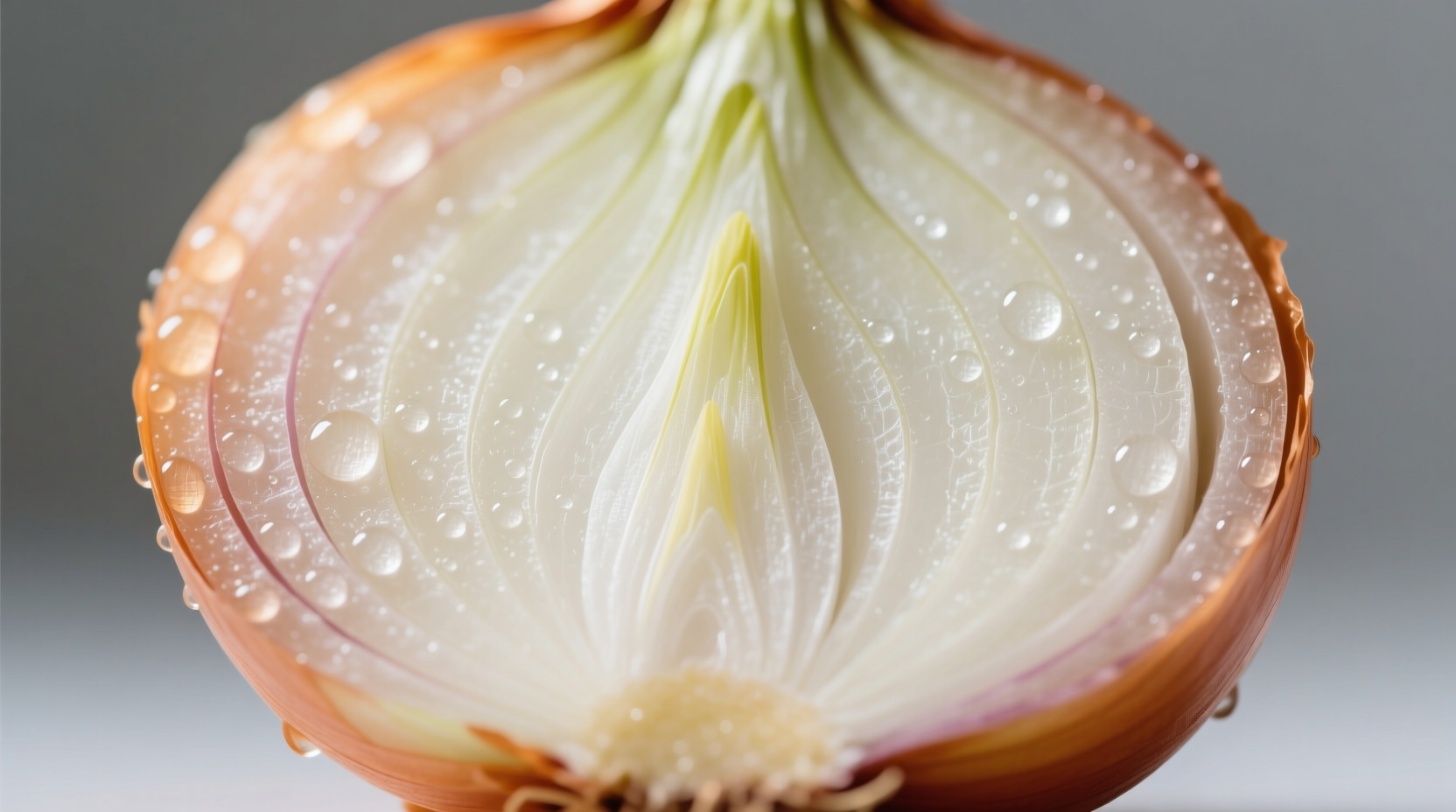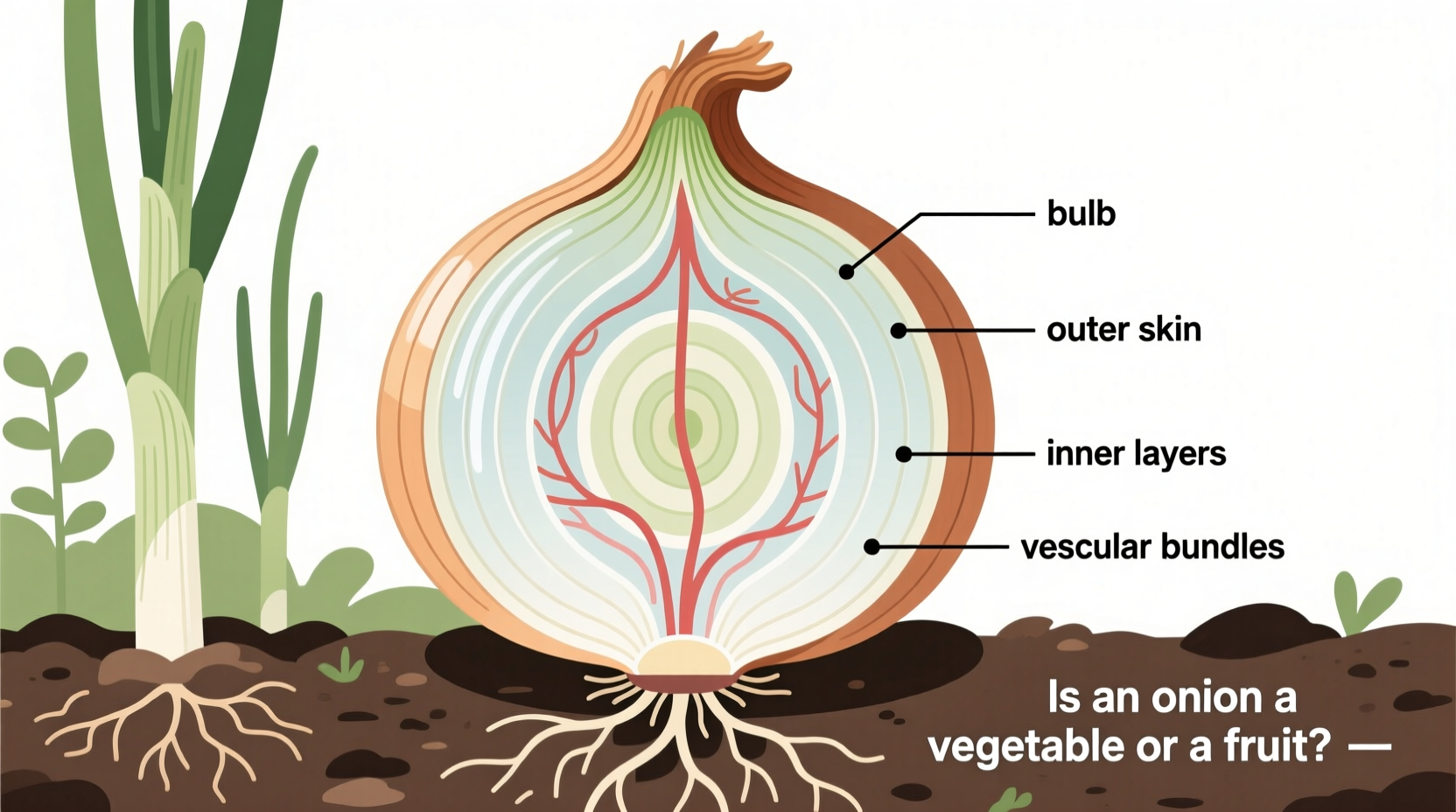Onions are botanically classified as vegetables—specifically, a type of modified underground stem called a bulb. They do not develop from a flower's ovary or contain seeds, which are defining characteristics of fruits. This clear botanical distinction resolves the common confusion about onion classification.
Understanding whether an onion is a vegetable or fruit isn't just academic—it affects how you use this kitchen staple. As a culinary professional with over 15 years of experience working with ingredients at both molecular and practical levels, I've seen how this confusion impacts cooking techniques and recipe development. Let's clarify this once and for all with science-backed information you can trust.
The Botanical Truth: Why Onions Are Vegetables
When examining is onion a vegetable or a fruit, we must first understand the scientific definitions that govern plant classification. Botanists classify plant parts based on their origin and function in the plant's life cycle—not how we use them in cooking.
Botanically speaking, a fruit develops from the flower's ovary after pollination and contains the plant's seeds. Apples, tomatoes, and cucumbers all fit this definition. A vegetable, however, refers to other edible plant parts like roots, stems, leaves, or bulbs.
Onions (Allium cepa) grow as modified underground stems called bulbs. These bulbs store nutrients for the plant's survival through dormant seasons. Unlike fruits, onions contain no seeds and don't develop from a flower structure. The actual onion flower appears later as a separate structure that produces seeds.

Botanical vs. Culinary Classification: Why the Confusion?
The confusion about whether onion is a vegetable or fruit stems from the difference between scientific and culinary terminology. In cooking contexts, we classify ingredients by flavor profile and usage rather than botanical accuracy.
| Classification Type | Fruit Definition | Vegetable Definition | Where Onions Fit |
|---|---|---|---|
| Botanical | Develops from flower ovary, contains seeds | Edible roots, stems, leaves, bulbs | Vegetable (bulb) |
| Culinary | Sweet, often eaten raw or in desserts | Savory, used in main dishes | Vegetable (savory profile) |
This onion vegetable or fruit classification table shows why onions consistently fall under the vegetable category in both systems, despite common misconceptions. Unlike tomatoes (which are botanically fruits but culinarily vegetables), onions have no dual classification ambiguity.
When Classification Matters: Practical Kitchen Implications
Understanding why onions are vegetables not fruits has real cooking consequences:
- Storage practices: As bulbs (vegetables), onions require dry, cool storage—unlike fruits that often need refrigeration after ripening
- Cooking chemistry: The sulfur compounds in onion bulbs react differently to heat than fruit sugars would
- Recipe substitution: You can't replace onions with fruits in savory dishes without dramatically altering flavor chemistry
- Nutritional planning: Onions contribute vegetable-based nutrients like quercetin, not fruit-based vitamins like high-dose vitamin C
At the USDA's Agricultural Research Service, scientists consistently classify onions under vegetable commodities in their nutritional databases, reinforcing this botanical reality. The confusion often arises because some plants (like tomatoes and cucumbers) are botanically fruits but culinarily treated as vegetables—a distinction that doesn't apply to onions.
Common Misconceptions About Onion Classification
Several factors contribute to the persistent question is an onion a fruit or vegetable:
- Misunderstanding plant biology: Many people don't realize that "fruit" has a specific botanical meaning beyond "sweet food"
- Overgeneralization: Since some "vegetables" are technically fruits, people assume all ambiguous cases work the same way
- Lack of flower observation: Home cooks rarely see onions flower, so they don't witness the actual fruit (seed pod) developing separately from the bulb
When examining onion vegetable or fruit scientific classification, peer-reviewed botanical journals like those from the American Society of Plant Taxonomists consistently categorize Allium species as vegetables. The International Code of Nomenclature for Cultivated Plants confirms this classification through its standardized terminology.
Practical Takeaways for Home Cooks
Now that we've settled is onion a vegetable or a fruit, here's how to apply this knowledge:
- Treat onions as vegetables in meal planning for proper nutritional balance
- Store onions like other root vegetables (in mesh bags, away from potatoes)
- Understand that onion's flavor development comes from enzymatic reactions in bulb tissue, not fruit sugar caramelization
- Recognize that sprouting onions are sending up flower stalks (which will eventually produce actual fruit/seed pods)
Professional chefs leverage this botanical understanding to maximize flavor. When I teach cooking classes, I emphasize that recognizing onions as bulbs explains why slicing triggers that characteristic pungent reaction—it's the plant's defense mechanism from damaged stem tissue, not a fruit ripening process.
Why This Classification Matters Beyond the Kitchen
The botanical classification of onions as vegetables affects more than just cooking. Agricultural policies, import regulations, and nutritional guidelines all rely on accurate botanical categorization. The Food and Agriculture Organization of the United Nations maintains strict botanical classifications that determine how crops like onions are traded and subsidized globally.
For gardeners, understanding that onions are bulbs (vegetables) rather than fruits informs proper planting depth, watering schedules, and harvesting techniques. Unlike fruit-bearing plants that require pollination management, onion cultivation focuses on optimizing bulb development through day-length control and nutrient management.
Conclusion: The Clear Answer to a Common Question
The question is onion a vegetable or a fruit has a definitive answer: onions are vegetables, specifically bulbs. This isn't a matter of opinion or culinary tradition—it's established botanical fact. Understanding this distinction helps you make better cooking decisions, store ingredients properly, and appreciate the fascinating biology behind this kitchen essential.
Next time you chop an onion, remember you're working with a sophisticated underground storage organ—not a fruit. This knowledge transforms how you approach recipes and connects you to the remarkable evolutionary adaptations that make onions such a valuable culinary ingredient worldwide.











 浙公网安备
33010002000092号
浙公网安备
33010002000092号 浙B2-20120091-4
浙B2-20120091-4